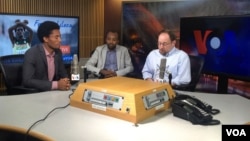Ethiopian runner Feyisa Lelisa, the silver medalist in last month's Olympic men's marathon, said his defiant, finish-line gesture against the Ethiopian government was no spontaneous act.
Feyisa grabbed worldwide attention when he crossed his wrists above his head in a sign of solidarity with anti-government protests in his native Oromia region that have left hundreds dead since last November.
"As soon as I was selected [for the Olympics], I decided that I would use this opportunity to take the voice of my people and make the protest be seen and also their voice be heard," Feyisa told VOA in Washington Thursday.
"The Oromo people were protesting," he added. "They have not gotten much coverage to what was happening on the ground.So I knew people would be watching. I wanted to use that opportunity. .... So I made my decision three months before the race."
Feyisa also reiterated his belief that if he returns to Ethiopia he will be punished or killed. An Ethiopian government spokesman said after the Olympics that Feyisa would be welcomed if he came home.
But Feyisa dismissed the comments, saying the spokesman "has insulted the great Oromo nation before on TV. He demonized the largest ethnic group in the country. ... I do not believe anything," he said, "and I do not trust what the Ethiopian government says, and that is why I cannot go back to Ethiopia."
The protests in Oromia, which broke out last November, were sparked by disputes over land rights and fair representation in the government.
Feyisa arrived in Washington earlier this week.Tuesday, he called on the U.S. Congress to take action in solidarity with Ethiopians protesting their government.
"I know that Americans are peace-loving people," he said. "My people are also peace-loving people, but they have been denied peace for a very long time."
Speaking in his native Afaan Oromoo at a news conference Tuesday on Capitol Hill, he said "people are calling for the freedom, democracy that you have here. We want the same things and I call on the U.S. government to urge the Ethiopian government to make sure that democracy prevails in Ethiopia."
U.S. representatives Chris Smith, Keith Ellison and Mike Coffman presented House Resolution 861 titled "Supporting human rights and encouraging inclusive governance in Ethiopia" during the news conference.
The resolution calls on the government of Ethiopia to end the use of excessive force by security forces and make a full, credible and transparent investigation into the killings and instances during protests in the Oromia and Amhara regions. It also urges the government to hold security forces accountable for wrongdoing through public proceedings.
Smith said that he met with Prince Zeid Ra'ad Al-Hussein, the United Nations High commissioner for Human Rights in New York to discuss human rights issues in Ethiopia.
"He's called for a major fact-finding effort where we could get to the bottom of people who are being killed, tortured, slaughtered in the streets and then to hold the perpetrators of these crimes to account," he said.
The resolution has been signed by 11 civil society organizations. "It's an effort to say to Ethiopia, yes, you've been friends and allies in the war on terror. You've got some very good things with regards to Somalia, but you are mistreating your own people and it's time we spoke out," said Smith, who represents a district in the U.S. state of New Jersey.
Since Lelisa made his gesture, other athletes have followed suit. Ebisa Ejigu crossed his arms in the Quebec City Marathon in Canada and Tamiru Demisse, an Ethiopian paralympic runner, did the same as he won his silver medal in the men's 1,500 meters for the visually impaired at the Paralympics in Rio.
Lelisa is currently on a temporary U.S. visa and planning to figure out his future. However, he stated that he is not seeking asylum in the U.S.




